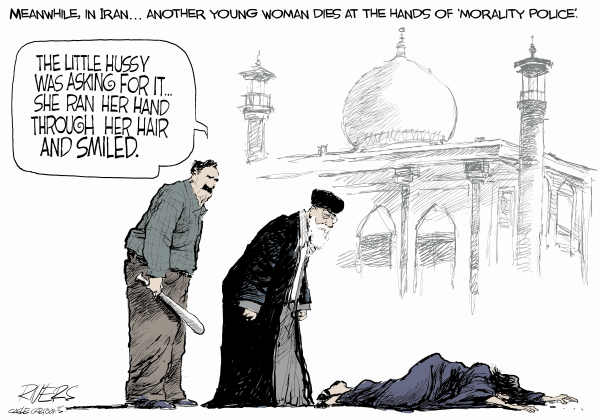
Subscribers Only Content
High resolution image downloads are available to subscribers only.
Not a subscriber? Try one of the following options:
OUR SERVICES VISIT CAGLE.COMFREE TRIAL
Get A Free 30 Day Trial.
No Obligation. No Automatic Rebilling. No Risk.
As I write this, the clock is ticking.
I have exactly six more hours in the Facebook gulag, the last stretch of a weeklong sentence imposed by the invisible community police after I reposted a picture of Iranian women being beaten in the streets of Tehran, and added my own caption: “Ladies, burn those pink pussy hats and stand back: these are the real heroes.”
Apparently the algorithms, which are the algebraic equivalent of a sulking adolescent female, thought that using the word “burn” in proximity to “Ladies” was a form of violence. For the Facebook prison guards, I was no different from a mullah bashing in the head of an Iranian woman who wore her hijab incorrectly.
It is this sort of thing that has angered me since I first began to practice immigration law. Last week, I helped a woman from El Salvador win asylum after years of being abused by the men in her family, something that anyone who has a passing familiarity with the countries of the Northern Triangle would completely understand.
A few months before that, a woman from Egypt who’d been married to a former police officer won asylum after she proved that his colleagues covered up for him when he beat her with an ashtray, burned her with cigarettes, starved her and locked her in a room for days on end.
And I’m still dealing with the debacle in Afghanistan, as family members try and get female relatives to safety after the Taliban took control.
This is sacred work for me. I have always been surrounded by strong women in my own life, from the Italian matriarchs who raised me to the nuns who educated me to the professional mentors like Lynne Abraham, who gave me amazing examples to follow and to emulate.
That’s why, when I see women being beaten down and deprived of the rights and privileges we take for granted here, I jump to action. If I weren’t practicing in this field, I would not be practicing at all.
While I can empathize with Americans who say that our own women suffer, because I have personal confirmation that we do, there is something jarring and repellent about the naivete of my citizen sisters.
The suggestion that a woman who was improperly propositioned by a Hollywood director, ogled by a morning show host, sniffed by an elderly senator or “misgendered” by a male teacher was a victim of true abuse is upsetting in a way that I find hard to explain to someone who never sat in on an asylum hearing.
Yes, sexism exists in the United States. Women are raped and abused. Domestic violence is still a scourge that no amount of public engagement and consciousness-raising will ever completely eradicate.
But to paraphrase our president, Come on Ma’am!
There are women who are being killed in Iran because centimeters of their hair are visible to triggered men. There are girls who are being murdered in Honduras because they refuse to date a member of Mara Salvatrucha. There are female children in Mali who are having their genitals cut and sutured so that the wicked and perverted standards of purity espoused by certain tribes are satisfied.
There are lesbians in Albania being raped because of their sexual orientation.
And here, we fire professors for using the wrong pronouns and think female soccer players who are already making millions of dollars are victims because the men — who people prefer to watch — are making more.
Here, we have doctors like Leah Torres making statements like “GTFO my uterus” on her Twitter feed, after explaining how unborn babies can’t scream because she cuts their cords before a larynx is formed.
And so on, unto an infinity of voices droning on about how horrible it is to be a woman in the United States of America, a place with four women on the highest court, a woman of color only a heartbeat away from the presidency — God help us — and where men commit suicide at a much higher rate than the oppressed sisters.
I’ve written about this before, and the response is always the same: just because it’s bad over there, doesn’t mean it’s OK over here. And then I see women being beaten and killed, mauled and disappearing because of an item of clothing, and I want to scream that IT IS OK over here.
At least we have our voices, and our pens. At least we have that split second between protest and punishment, to run to safety.
At least we’re not them. And for that, we need to give humble thanks.
–
Copyright 2022 Christine Flowers, distributed exclusively by Cagle Cartoons newspaper syndicate.
Christine Flowers is an attorney and a columnist for the Delaware County Daily Times, and can be reached at [email protected].